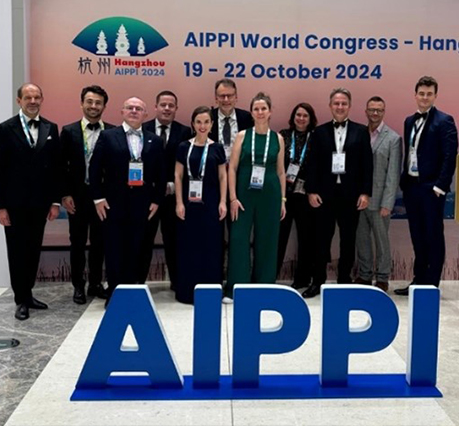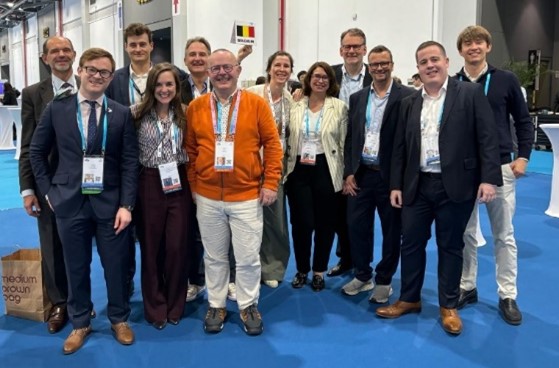Belgian Activities at the 2024 AIPPI World Congress
12 Dec 2024 | Newsletter

The 2024 AIPPI World Congress, held in Hangzhou, China, brought together a global assembly of IP professionals to deliberate on important issues in intellectual property law. The event, spanning four days from 19 to 22 November, was marked by dynamic exchanges, engaging panel sessions, and vibrant social events. The Belgian delegation participated enthusiastically in the Congress, both in shaping resolutions and in sharing perspectives during the discussions.
Resolutions and Belgian Contributions
The Belgian delegation actively contributed to the drafting and fine-tuning of the following resolutions that address contemporary challenges in IP law.
- Resolution Q290: Conflicts Between Composite Trade Marks including Non-Distinctive Elements
This resolution sought to establish a nuanced framework for assessing similarity and likelihood of confusion when one or both conflicting marks are composite trade marks containing non-distinctive elements. Belgium was instrumental in proposing refinements to the Dominant Element Rule, emphasizing the role of distinctiveness in evaluating trade marks similarity. The debate highlighted a balance between considering dominant and non-distinctive elements, ensuring that neither is entirely disregarded. Belgium also proposed including the “nature and characteristics of the relevant goods or services” as a factor in assessments, which was unanimously accepted. - Resolution Q291: The Defence of Parody in Copyright
This resolution recognized parody as an exception or defence against copyright infringement, framing it as a form of freedom of expression. Belgium contributed to key discussions, notably challenging the requirement that parodies be “recognizably” different from the original work, arguing it might unjustly limit legitimate forms of parody. Despite opposition, this criterion was finally retained. Additionally, the Belgian delegation highlighted the importance of considering humor or mockery in defining parody, engaging in rich debates on its relevance across jurisdictions. These discussions illuminated striking differences in legal cultures and interpretations of parody’s scope. - Resolution Q292: Unjustified Allegations of IP Infringement
This resolution, aimed at harmonizing laws on unjustified allegations of IP infringement, benefited from Belgium’s proactive input too. The Belgian delegation advocated amending and including new factors in the list of factors that conclusively turn an allegation of IP infringement into an unjustified allegation. Its members also engaged in debates on whether constructive knowledge of validity-destroying circumstances and circumstances leading to non-infringement, should be included in this list. While some of its proposals were not adopted, Belgium’s is pleased to have participated in strengthening the resolution’s emphasis on predictability in assessing the legitimacy of allegations of IP infringement. - Resolution Q289: Harmonisation of disclosure requirements and consequences of non-compliance
The delegation was also involved in the debate regarding the harmonisation of disclosure requirements and the consequences of non-compliance. As for the other resolutions, the delegation submitted its views and playing a pivotal role in shaping the adopted resolution.
Panel Sessions and Discussions
Our Belgian representatives also attended and contributed to a diverse array of panel sessions, which explored both contemporary and emerging issues in IP law.
- AI and Drug Discovery: This session, moderated by Daphné Derouane (UCB, Belgium), delved into the complexities of AI-assisted inventions, particularly in drug discovery. The panel raised critical questions about human involvement and its sufficiency to establish inventorship in AI-driven processes.
- Unified Patent Court (UPC): Celebrating the UPC’s first year, this panel examined procedural aspects such as injunctions, descriptive seizure orders, and proceedings on the merits. Insights from UPC judges and lawyers underscored the court’s evolving framework.
- Trade Secrets and Employee Mobility: Chaired by Sarah Van Den Brande (Liedekerke, Belgium), this session highlighted varying best practices on protecting employer’s trade secrets. Divergences in legal cultures emerged in dealing with the conflict between employer’s trade secrets and employees’ personal data.
- Referential Trade Mark Use: This session scrutinized the limits of using another’s trade mark in a referential context, focusing on proportionality and compliance with honest practices. Divergent judicial outcomes across jurisdictions underscored the challenges in achieving consistency.
- Copyright Longevity and Artistic Protection: This session explored the intersection of copyright and trade mark law, examining the extension of protection for copyrighted works and their potential misuse in trade mark applications.
Other panels covered pressing issues like trade mark exhaustion, extraterritorial effects of trade marks, and the role of proportionality in granting patent injunctions.
Cultural and Social Events

The Congress also featured numerous cultural and social events, offering attendees opportunities to network and immerse themselves in local traditions.
- Belgian Lunch: The Belgian delegation organized a Belgian lunch pursuant to its traditions at AIPPI conferences. This was a great opportunity for all delegates to discuss the progress of the various committees.
- Receptions and Ceremonies: From the first-time attendees’ cocktail to the closing gala dinner, these events created a vibrant atmosphere for informal exchanges. The opening ceremony featured eminent speakers, including China’s Vice Premier Guoqing Zhang and WIPO Director General Daren Tang, alongside Kung Fu performances and traditional Chinese dance.
- Cultural Highlights: Attendees enjoyed a light-and-dance live performance at the West Lake, and stunning views of Hangzhou’s illuminated skyline.
Conclusion
The AIPPI World Congress 2024 provided a dynamic platform for fostering international collaboration and advancing IP laws. The Belgian delegation’s contributions, marked by thoughtful proposals and active participation, showcased their expertise and commitment to shaping global IP discourse. Beyond formal sessions, their involvement in cultural exchanges and social events underscored the importance of building connections across jurisdictions. As the IP landscape continues to evolve, Belgium’s active role at such forums ensures their voice remains an import part of the conversation.[1]
[1] The full report on the AIPPI World Congress 2024 will be published on https://www.aippi.be/documents and in Ing. Cons. 2024/4.



